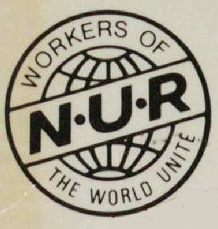Related Research Articles
The Associated Society of Locomotive Engineers and Firemen (ASLEF) is a British trade union representing drivers of trains including services such as the London Underground (Tube). It is part of the International Transport Workers' Federation and the European Transport Workers' Federation. At the end of 2019 ASLEF had 24,479 members. Mick Whelan became its General Secretary in 2011.

Dick Taverne, Baron Taverne, is a British politician and life peer who served as Member of Parliament (MP) for Lincoln from 1962 to 1974. A member of the Liberal Democrats, he was a Labour MP until his deselection in 1972, following which he resigned his seat and won the subsequent by-election in 1973 as a Democratic Labour candidate.

The National Union of Railwaymen was a trade union of railway workers in the United Kingdom. The largest railway workers' union in the country, it was influential in the national trade union movement.
James Knapp was a British trades unionist. He was successively General Secretary of the National Union of Railwaymen (NUR) from 1983, and then of the merged National Union of Rail, Maritime and Transport Workers (RMT) from 1990 to his death in 2001. He served on the executive board of the International Transport Workers' Federation from 1983 to 2001, the General Council of the Trades Union Congress from 1983 to 2001, and was President of the Trades Union Congress in 1994.
Alfred Balfour was a British railwayman and politician. He worked his way up from being a baker's message boy to serve as a member of parliament for fourteen years. He was marked by his loyalty to party and near silence in the House of Commons where he waited eight years after being elected before making his maiden and only speech.
Sidney Weighell was an English footballer, trade unionist and the General Secretary of the National Union of Railwaymen from 1975 to 1983.

Concemore Thomas Thwaites Cramp, known as Charlie Cramp, was a British trade unionist and political activist.
James Campbell was a Scottish trade union leader.
John Benstead was a British trade unionist.
James Hugh Blair Figgins was a Scottish trade unionist.
Thomas Charles Morris, often known as "Top Cat" Morris, was a Welsh trade unionist and socialist activist, who served on the National Executive Committee of the Labour Party.
The National Administrative Council (NAC) was the executive council of the Independent Labour Party (ILP), a British socialist party which was active from 1893 until 1975.
Tom Hollywood was a British trade unionist.
Tom McLean was a trade unionist and political activist.
Frank Lane was a British trade unionist, who served on the National Executive Committee of the Labour Party.
John Edward Binks was a British trade unionist and politician, who served as President of the National Union of Railwaymen, and as an alderman on the London County Council.
Walter T. Griffiths was a Welsh trade union leader.
James William Whitworth was a British trade union leader and politician.
Russell Tuck was a British trade unionist, who was second-in-command of one of the country's largest unions and also sat on the executive of the Labour Party.
William Ballantine was a Scottish fireman, trade unionist and socialist activist.